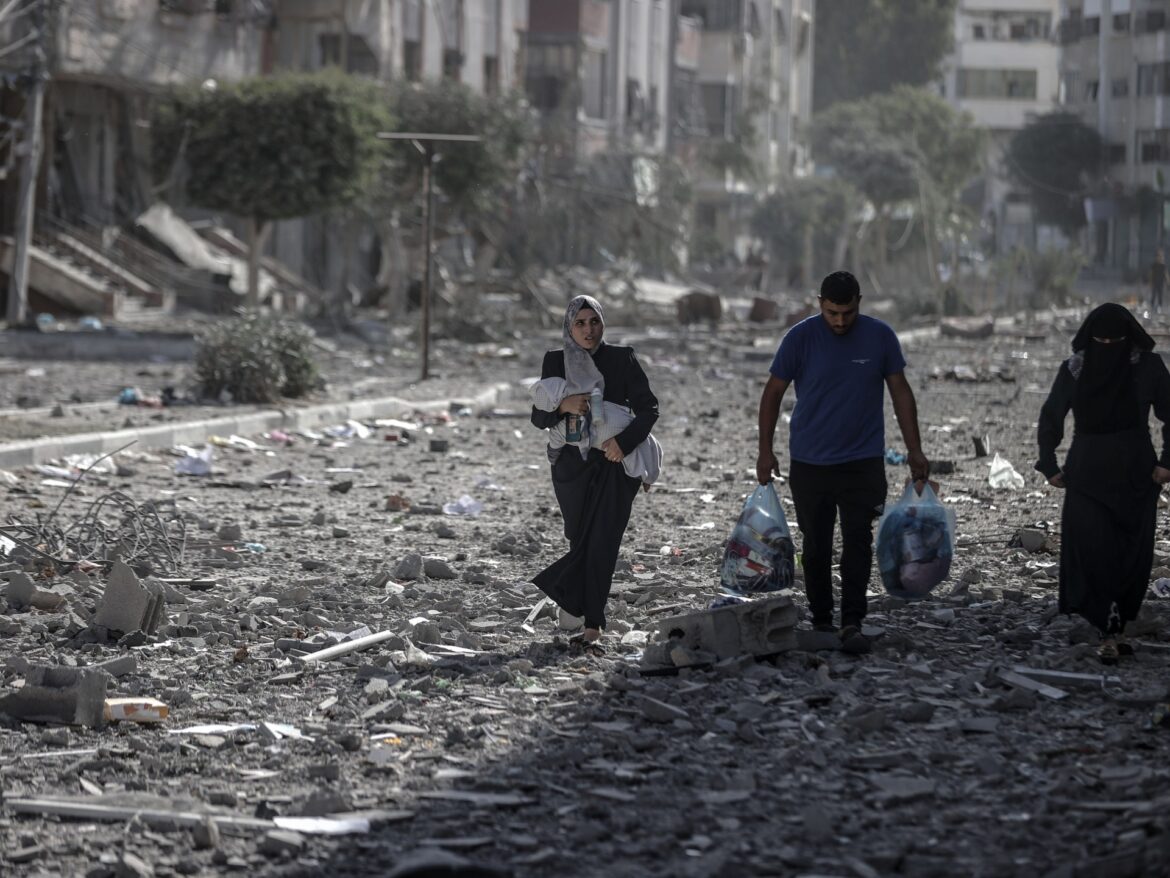On October 28, Israeli military spokesperson Daniel Hagari took to X – the platform formerly known as Twitter – with an “urgent message” for the residents of the Gaza Strip. For their “immediate safety,” Hagari said in a message entirely in English, residents of northern Gaza and Gaza City were asked to “temporarily relocate to the south.”
The spectacle was grotesquely absurd for a variety of reasons, including the fact that English is not the official language of either Israel or Palestine – suggesting that the intended audience was not, in fact, the population whose “immediate security” was supposed to be such. concern for Hagari & Co.
Indeed, if security were truly a concern, the Israeli army would not have massacred more than 8,000 Palestinians in three weeks, including more than 3,000 children. Nor would Israel have continued carpet-bombing northern and southern Gaza after previously warning Palestinians in the north of the enclave to evacuate the south.
Equally critical, it is unclear how anyone in Gaza was supposed to see this “urgent message” from Hagari given the total communications blackout that Israel had orchestrated the day before, leaving the territory without telephone or internet service. Regardless, the evacuation warning was probably appreciated by that part of the online English-speaking world that persists in believing that Israel is truly trying not to kill civilians.
Communications in the Gaza Strip have since been partially restored, a turn of events that the Wall Street Journal attributes to U.S. pressure on Israel. Certainly, it is ethically much more important to maintain the Internet in Gaza than, for example, to stop financing Israel’s genocide of the Palestinians.
The temporary outage, however, was long enough to cause a widespread sense of helplessness among many people around the world, especially those with family in Gaza. The torturous uncertainty was captured in many social media posts, like this one from my Facebook friend Majed Abusalama: “Mama, Baba, Mohammed, Naya, Eliya, Asmaa and others may be killed or alive. »
Majed, an Al Jazeera contributor originally from the Jabalia refugee camp in Gaza but currently residing in Berlin, is himself a survivor of repeated Israeli attacks on Gaza, including when his school was hit by illegal white phosphorous munitions . Elya is his six-year-old niece; her other niece Naya is only two months old, which means she has spent almost half her life under Israeli bombs.
When my father died of cancer in August this year, Majed sent me an emotional note expressing his sincere condolences and his own fear of losing his parents – an entirely constant possibility given where they lived. One day, during an Israeli bombing, he said, his mother called him from Gaza to say goodbye.
Now, of course, the phone lines were down, and I found myself frantically checking Majed’s Facebook page to see if any news had managed to break through the void. He had already lost many relatives and friends to Israeli assaults, but his immediate family had so far survived. When communications were partially restored on Sunday, they were still among the living – although many Palestinians were not.
The 36-hour power outage likely proved particularly deadly because it hampered the work of rescue teams, who could not be contacted to extract people from the rubble and otherwise intervene for those in need. Meanwhile, the communications blackout has understandably only further hampered the efforts of journalists and Gazans – who already face fragile phone and internet services on a daily basis – to convey the truth about an ongoing genocide in real time.
And while Gaza is currently precariously back online, the bloody offline interlude arguably also metaphorically encapsulates Israel’s unspeakably sinister goal: to make the Palestinians disappear both physically and conceptually.
In fact, it is hardly an exaggeration to claim that removing Palestinians from Gaza from the online network constitutes a modern variation on the centuries-old phenomenon of enforced disappearances, at least in terms of the lack of victim accountability as well as the effects psychological effects on their families. Just as missing people cannot aspire to justice while missing, their loved ones cannot aspire to emotional closure without knowing their fate and fate.
As we have seen repeatedly over the decades in situations of mass enforced disappearances, from Argentina to El Salvador and from Spain to Sri Lanka, family members of disappeared people are often condemned to a psychological void perpetual, unable to begin the necessary human grieving process while remaining in the dark as to exactly what happened to the missing person.
A few years ago, in the village of Maaroub in southern Lebanon, I spoke with a silver-haired man named Abed, whose younger brother Ahmed had been involved in the Palestine Liberation Organization (PLO). in Lebanon and disappeared in 1983, the year after an apocalyptic war. The Israeli invasion of the country killed tens of thousands of Lebanese and Palestinians. According to Abed, one theory was that Ahmed ended up in an Israeli prison, but the lack of concrete information meant his family members had to spend the rest of their lives in a state of emotional torture.
Clearly, Israel’s recent blackout experiment in Gaza was a disappearing act of shorter duration. And yet, in the context of the past 75 years of Israeli ethnic cleansing and massacres of Palestinians, this should send an “urgent message” – to borrow the well-worded words of Israeli spokesperson Hagari.
We remember the late Israeli Prime Minister Golda Meir’s notorious assertion that “there was no Palestinian people,” which certainly aided Israel’s history of butchery; after all, it’s easier to bomb people if they don’t exist, right? And maybe even more so if they’re all offline.
But unfortunately for the State of Israel, neither the Palestinian people nor Israeli war crimes go away easily – and that in itself should be an urgent message to Israel.
The opinions expressed in this article are those of the author and do not necessarily reflect the editorial position of Al Jazeera.



